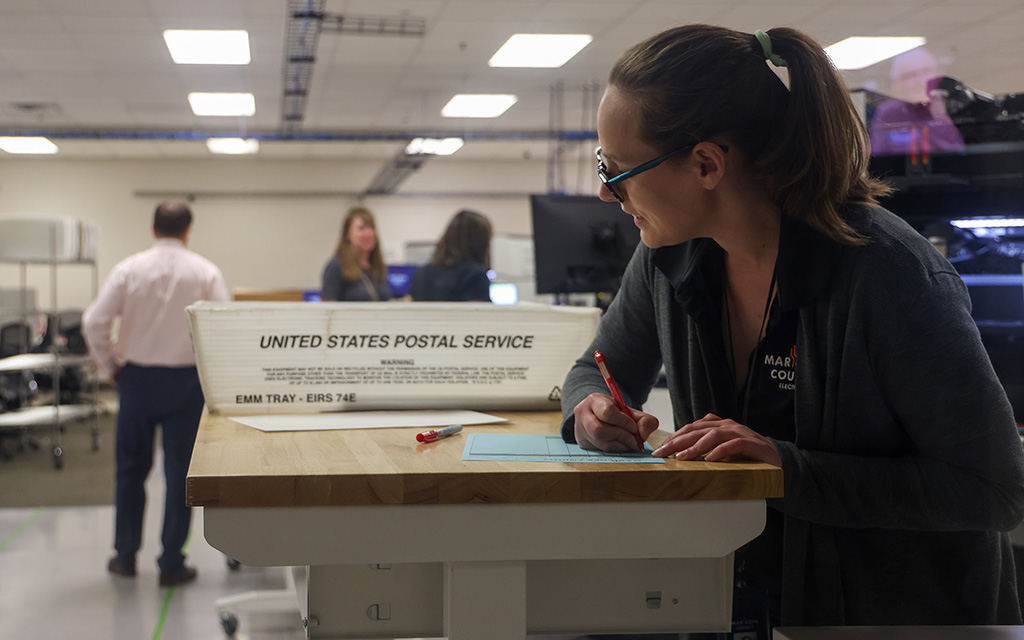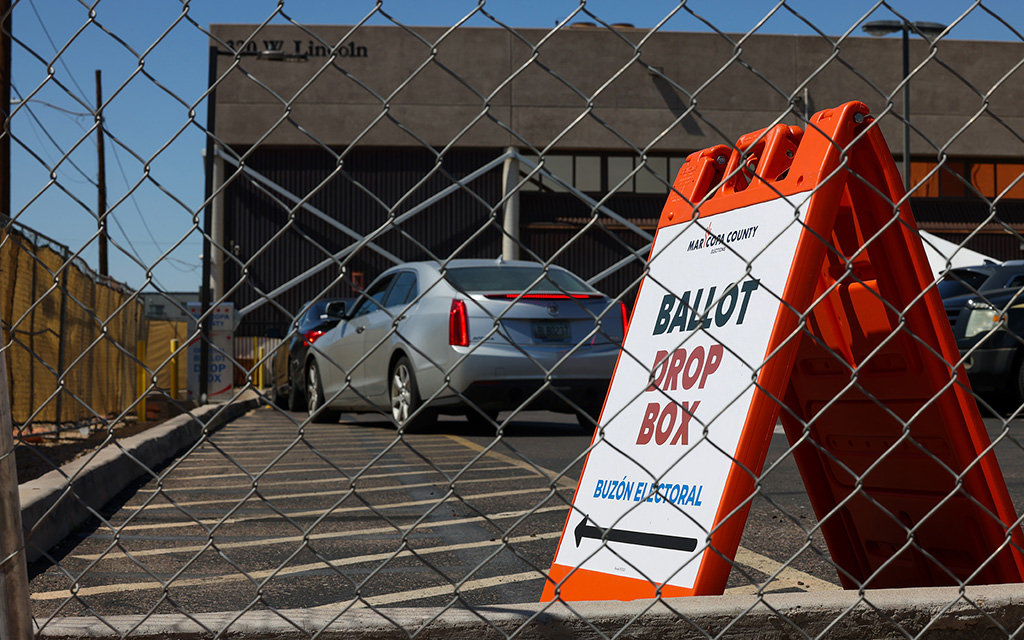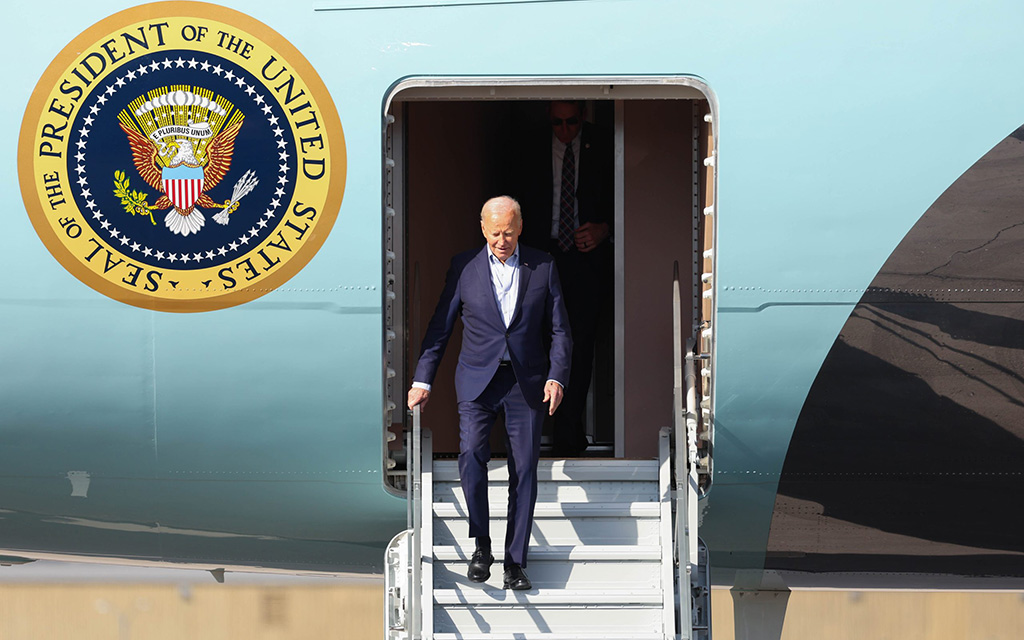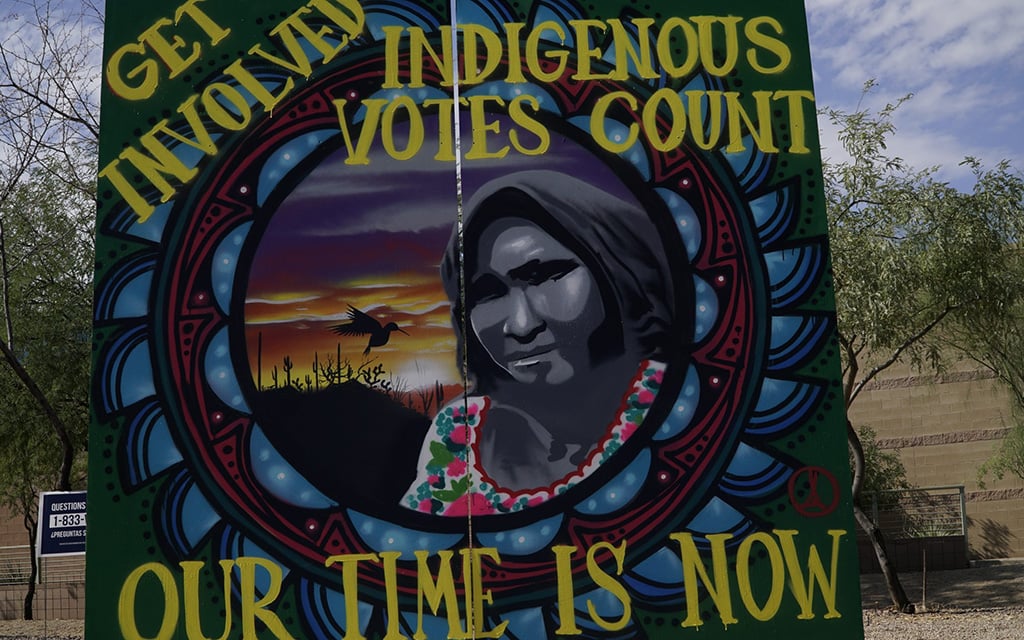
Christine Dyer, the deputy director of elections at the Maricopa County Tabulation and Election Center, counts ballots Tuesday from the 2024 presidential preference election. Election officials said it was a smooth day of voting. (Photo by Kayla Mae Jackson/Cronkite News)

Voters drop their ballots Tuesday at the Maricopa County Tabulation and Election Center for the presidential preference election. Officials said increased security around the center was a response to the uproar after 2020 and 2022. (Photo by Kayla Mae Jackson/Cronkite News)
PHOENIX – President Joe Biden and former President Donald Trump cruised to victory in Arizona’s presidential preference election Tuesday, easily outdistancing challengers despite an organized protest vote and former challengers who were still on the ballot.
In early returns, Biden had 89.7% of votes from Democrats, far ahead of the 3.5% for challenger Marianne Williamson. She had been pushed as an alternative by groups calling for a ceasefire in Gaza, who hoped to send a message to Biden over his administration’s support for Israel.
Trump, meanwhile, had 76.7% of the Republican vote compared to 19.8% for Nikki Haley, the former South Carolina governor – and Trump’s former United Nations ambassador – who dropped out of the race two weeks ago after winning only a handful of delegates in early primary states.
The outcome was never really in doubt – both Trump and Biden had locked up the delegates necessary to win their parties’ nominations last week, after the bulk of states had held their primaries.
While Biden had the more comfortable margin of victory, Trump earned more votes overall, with 412,135 votes to Biden’s 348,083 votes in unofficial returns three hours after polls closed.
Sean Noble, an Arizona political consultant, said the low Democratic turnout shows a potential problem this fall for Biden in a state that he won by a slim margin in 2020.
“While Biden is a lock because he got 90% of the vote, there are definitely Democrats that are staying home because they are not enthusiastic about voting for him,” he said.
Noble said enthusiasm is not the only concern for Democrats: Third-party candidates – like independents Robert F. Kennedy Jr. and Cornel West, and the Green Party’s Jill Stein – could pull more votes from Biden in November. About 34% of Arizona voters are registered as independents, with thousands more registered in smaller parties, according to the Arizona Secretary of State’s office.
Biden won Arizona in 2020 by a little more than 10,000 votes, only 0.3% of the total 3.4 million cast. The last time Arizona voted for a Democratic presidential candidate was in 1996 when Bill Clinton won the state – and that was the first Democratic victory since 1948.
“In a state like Arizona, which Trump won narrowly the first time (in 2016) and he lost very narrowly to Biden, for the Republican turnout to be significantly higher than the Democrats, it’s just got to be a concern for them,” Noble said.
But Noble said the fact that one in five Republicans voted for Haley shows “some issues that Trump’s going to have to deal with.”
Haley, who ended her campaign earlier this month, won more than 100,000 votes from Arizona Republicans on Tuesday. The last remaining candidates in a field of GOP hopefuls that set out to beat Trump, she not endorsed his candidacy.
Florida Gov. Ron DeSantis, former New Jersey Gov. Chris Christie and tech entrepreneur Vivek Ramaswamy – all of whom have long been out of the race – also picked up thousands of votes across Arizona.

President Joe Biden gets off Air Force One Tuesday afternoon in Phoenix where he was scheduled to stay overnight. The stop was part of a two-day campaign tour through Nevada, Arizona and Texas. (Photo by Reece Andrews/Cronkite News)
Rep. Dean Phillips, D-Minn., got 11.055 Democratic votes despite dropping out of the race earlier this month. Williamson won 13,480 votes, in part thanks to an organized protest campaign by #VoteCeasefireAZ.
Protest votes in support of a ceasefire in Gaza have gained traction in recent presidential primary elections in other states. About 100,000 Michigan Democrats selected uncommitted on their presidential primary ballots early this month, 13.2% of the vote.
#VoteCeasefireAZ settled on Williamson’s campaign because Arizona, unlike other states, “does not offer an Uncommitted or No Preference option or an option to write in ‘Ceasefire.’”
“Because of these limitations, organizers of the campaign say that marking Marianne Williamson on the ballot is the best option for sending a clear, easily-measurable protest message against Biden’s policy on election night,” campaign organizers said in a March 6 press release.
With a generally low turnout and the vast majority of ballots being cast early, election officials reported a smooth Election Day.
“We’ve had smooth sailing throughout most of the day. Normal minor issues that you’d see on Election Day,” said Zach Schira, the executive director of Maricopa County Elections. “Elections are a human endeavor, and none of them are perfect. And I think today was just a normal, well-run Election Day.”
There was a heavy security presence Tuesday at Maricopa County Tabulation and Election Center. Chain-link fences covered with drapes surrounded the perimeter and sheriff’s deputies patrolled the property. Schiara said it was a response to security concerns following the 2020 and 2022 elections.
“It is of utmost importance for us to make the public feel that what is happening at this building, is safe and secure. And part of that is making sure that the facility is safe and secure,” he said.
Schira said about 540,000 early ballots were delivered and tabulated over the weekend, compared to about 30,000 ballots cast Tuesday. He said that was typical for Maricopa County, which usually gets about 80% to 90% of ballots from early voting and mail-in ballots.
Even though there was little at stake in Arizona’s election Tuesday, Schira said it was an important exercise.
“I think it’s important for voters to feel like they had a say in choosing their presidential candidates,” Schira said. “And, you know, state statute tells us that we have to run this election, and we do what statute tells us to do.”




